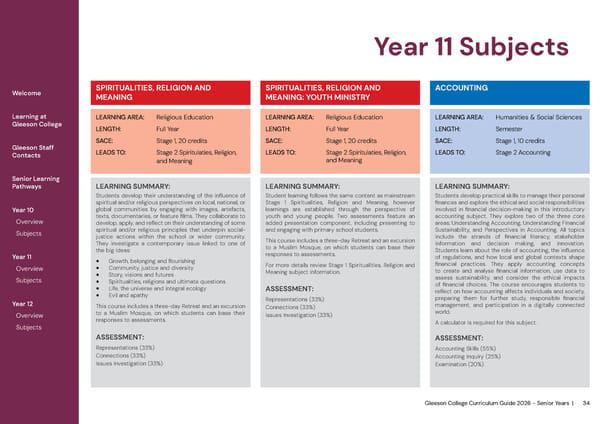Gleeson College Curriculum Guide 2026 - Senior Years | 34 Year 11 Subjects Welcome Learning at Gleeson College Gleeson Staff Contacts Senior Learning Pathways Year 10 Overview Subjects Year 11 Overview Subjects Year 12 Overview Subjects LEARNING SUMMARY: Students develop their understanding of the influence of spiritual and/or religious perspectives on local, national, or global communities by engaging with images, artefacts, texts, documentaries, or feature films. They collaborate to develop, apply, and reflect on their understanding of some spiritual and/or religious principles that underpin social- justice actions within the school or wider community. They investigate a contemporary issue linked to one of the big ideas: • Growth, belonging and flourishing • Community, justice and diversity • Story, visions and futures • Spiritualities, religions and ultimate questions • Life, the universe and integral ecology • Evil and apathy This course includes a three-day Retreat and an excursion to a Muslim Mosque, on which students can base their responses to assessments. ASSESSMENT: Representations (33%) Connections (33%) Issues Investigation (33%) SPIRITUALITIES, RELIGION AND MEANING LEARNING AREA: Religious Education LENGTH: Full Year SACE: Stage 1, 20 credits LEADS TO: Stage 2 Spiritulaties, Religion, and Meaning SPIRITUALITIES, RELIGION AND MEANING: YOUTH MINISTRY LEARNING AREA: Religious Education LENGTH: Full Year SACE: Stage 1, 20 credits LEADS TO: Stage 2 Spiritulaties, Religion, and Meaning LEARNING SUMMARY: Student learning follows the same content as mainstream Stage 1 Spiritualities, Religion and Meaning, however learnings are established through the perspective of youth and young people. Two assessments feature an added presentation component, including presenting to and engaging with primary school students. This course includes a three-day Retreat and an excursion to a Muslim Mosque, on which students can base their responses to assessments. For more details review Stage 1 Spiritualities, Religion and Meaning subject information. ASSESSMENT: Representations (33%) Connections (33%) Issues Investigation (33%) ACCOUNTING LEARNING AREA: Humanities & Social Sciences LENGTH: Semester SACE: Stage 1, 10 credits LEADS TO: Stage 2 Accounting LEARNING SUMMARY: Students develop practical skills to manage their personal finances and explore the ethical and social responsibilities involved in financial decision-making in this introductory accounting subject. They explore two of the three core areas: Understanding Accounting, Understanding Financial Sustainability, and Perspectives in Accounting. All topics include the strands of financial literacy, stakeholder information and decision making, and innovation. Students learn about the role of accounting, the influence of regulations, and how local and global contexts shape financial practices. They apply accounting concepts to create and analyse financial information, use data to assess sustainability, and consider the ethical impacts of financial choices. The course encourages students to reflect on how accounting affects individuals and society, preparing them for further study, responsible financial management, and participation in a digitally connected world. A calculator is required for this subject. ASSESSMENT: Accounting Skills (55%) Accounting Inquiry (25%) Examination (20%)
 2026 Gleeson College Senior Years Curriculum Guide 2026 Page 33 Page 35
2026 Gleeson College Senior Years Curriculum Guide 2026 Page 33 Page 35